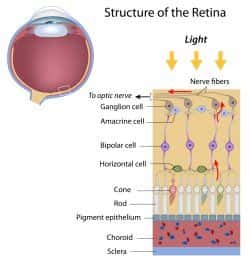Vision therapy is a doctor-supervised program that helps people of all ages improve their visual-motor skills. Therapy helps your eyes and brain work together better, even if you have perfect vision. For years, people believed that some types of eye conditions, such as lazy eye or crossed eyes, could
Read more
Retinal disorders are conditions that affect the layer of tissue at the back of the eye, known as the retina. This important part of the eye responds to light and passes on images to the brain. All retinal disorders affect your vision in some way, but some can also lead to blindness.
Macular degeneration. Also known as age-related macular degeneration (AMD), this condition affects the center part of the retina, the macula. This area is needed for the sharp, central vision that is used during everyday activities such as driving, reading or working with tools. This condition is a leading cause of vision loss in people over the age of 60 years old. Treatment can slow the loss of vision, but it will not restore vision that has already been lost.
Diabetic eye disease. The high blood sugar (glucose) levels that occur with diabetes can also affect vision. One type of diabetic eye disease is diabetic retinopathy, which affects the blood vessels in the retina. This can lead to blurry or double vision, blank spots in the vision and pain in one or both eyes. Diabetics may also be at higher risk of developing other eye conditions, such as cataracts and glaucoma.
Retinal detachment. This medical emergency happens when the retina pulls or lifts off of its normal position. It can cause symptoms such as floaters in the field of vision, light flashes and the feeling of a “curtain” in the way of your vision. If not treated right away, a retinal detachment can lead to permanent blindness in that eye.
Retinoblastoma. This cancer of the retina is generally uncommon; although, it is the most common type of eye cancer in children. The cancer starts in the cells of the retina, but can spread to other parts of the body (metastasize).
Macular pucker. Scar tissue on the macula can make the central vision become blurry and distorted. Although the symptoms are similar, macular pucker is not the same as age-related macular degeneration. The symptoms of a macular pucker are usually mild and do not require treatment. Sometimes, the scar tissue can fall off the retina on its own, and the vision will return to normal.
Macular hole. This condition is caused by a small break in the macula, which leads to blurriness and distortion in the central vision. Related to aging, this condition usually happens in people over the age of 60. Some macular holes close up on their own while others require surgery to help improve vision.
Floaters. These are specks, or “cobwebs,” that appear in the field of vision. Unlike scratches on the cornea, which follow your eye movements, floaters can drift even when the eyes are not moving. Most people have some floaters and have no problem with their vision. A sudden increase in the number of floaters, though, can indicate a more serious eye problem such as retinal detachment.
If you notice a change in your vision or simply have not undergone a routine eye ex
-
Vision Therapy: Not Just For ChildrenCategory: Newsletters, Tips for Healthy Eyes
-
Tips to Alleviate Dry EyesCategory: Newsletters, Tips for Healthy Eyes
Studies show that dry eyes are one of the most common eye problems throughout the United States. Dry eyes are caused by a lack of quality tear production, and are most common in both men and women over the age of 50. Tear production can be limited by a variety of causes; one of the most common is a specific
Read more -
Stop Rubbing Your EyesCategory: Newsletters, Tips for Healthy Eyes
It feels like a natural thing to rub your eyes when they are itchy, watery, or otherwise irritated. Keeping your hands away from your eyes, however, is a smart choice for promoting better eye health. Rubbing your eyes can lead to everything from eye injuries to damaged vision. Rubbing your eyes offers
Read more -
Nutrition and Your EyesCategory: Newsletters, Tips for Healthy Eyes
As you’ve probably heard, carrots are good for your eyes. Technically, they can’t give you superhero-quality eyesight like you may have been told when you were young, but they do contain ingredients that are instrumental in protecting your vision and overall health. Carrots are rich in beta-carotene
Read more -
How Did I Get a Stye?Category: Newsletters, Tips for Healthy Eyes
A stye, medically known as a hordeolum, appears in the eyelid area as a red pimple-like bump, and is usually tender or painful. Styes typically occur near the lash line (external hordeolum), but can also appear on the underside of the eyelid (internal hordeolum). In addition to the telltale lump, a stye
Read more -
How Can You Prevent an Eye Infection?Category: Newsletters, Tips for Healthy Eyes
Do your eyes feel swollen, itchy or watery? If so, you might want to book an appointment with your eye doctor to have your eyes examined. Although many people automatically attribute their discomfort to allergies, it’s important to leave the diagnosis to a trained professional that is knowledgeable
Read more -
What the Eyes Tell Us About Overall HealthCategory: Newsletters, Amazing, Interesting Eyes
Eyes are your window to the world. Everything you experience is enhanced by what you see. By the same token, eyes can be a window into your body. When it comes to your overall health, your eyes act like an open book shedding light on your condition. A thorough eye exam with your ophthalmologist or optometrist
Read more -
Vision Charities to Help You Give Back This Holiday SeasonCategory: Newsletters, Amazing, Interesting Eyes
Imagine trying to succeed at work at school if you could not see clearly. Unfortunately, that's the reality for far too many people in the world. Whether they cannot afford eye care, are blind or have a vision disability, poor eyesight makes life much more difficult. You can make a difference this holiday
Read more -
Eyeball Licking: A Dangerous New Trend?Category: Newsletters, Amazing, Interesting Eyes
In the summer of 2013, news spread quickly about a dangerous new trend, called "worming" or oculolinctus, and a serious outbreak of disease among Japanese youth. Upon further investigation, many news sources retracted or amended previously published stories, saying the stories of a sudden increase in
Read more -
Teaching Kids About Pink EyeCategory: Newsletters, Kid's Vision
Conjunctivitis is by no means limited only to children. An infection or inflammation of the conjunctiva -- the membrane within the eyelid and protecting the white aspect of our eyes -- can occur in individuals of any age secondary to an infection, an allergic reaction or chemical irritation. Infectious
Read more -
How Vision Problems Affect LearningCategory: Newsletters, Kid's Vision
Reading is an instrumental part of your child’s ability to learn. In order to write complete sentences or do mathematical problems, a child must first be able to understand what is on the page in front of them. If your child is suffering from vision problems, it may be drastically interfering with
Read more -
Getting Kids to Wear GlassesCategory: Newsletters, Kid's Vision
In most of North America, optometrists are known as Doctors of Optometry (D.O.). As physicians, they are able to diagnose eye disease and prescribe medications or corrective lenses. Licensure as a DO requires a Bachelor's Degree and successful completion of a four-year school of optometrics. Educational
Read more -
Allergy Management and Your EyesCategory: Newsletters, Tips for Healthy Eyes
For those who suffer from allergies, exposure to pets, pollen, or dust mites can quickly lead to red, itchy, watery eyes. Although seasonal allergies are notorious for causing eye symptoms, year-round exposure to allergens can be just as problematic. If you develop itchy, red, irritated, puffy, or watery
Read more -
5 Things You Can Do to Protect Your Eye HealthCategory: Newsletters, Tips for Healthy Eyes
Protecting your eyesight is an important part of maintaining your quality of life. Here are five simple things you can do to help preserve your vision. 1. Stop Smoking It is no secret that smoking is strongly linked to many health problems; however, did you know that it can also damage your eyes and
Read more -
Blue Light Exposure: What Is It?Category: Newsletters, Conditions That Affect Vision
Is blue light hurting your vision? Find out how the light can affect you.
Read more -
Is Office Lighting Affecting Your Vision?Category: Newsletters, Tips for Healthy Eyes
Do your eyes hurt, burn or itch after a day at work? Poor lighting may be to blame for your symptoms. Many companies use inexpensive fluorescent lighting to light large areas because it's a fairly inexpensive option. Unfortunately, your eyes pay the price. What Kinds of Eye Problems Can Fluorescent
Read more

